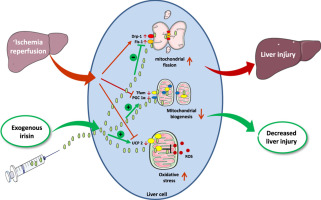Redox Biology ( IF 10.7 ) Pub Date : 2018-10-24 , DOI: 10.1016/j.redox.2018.10.019 Jianbin Bi , Jia Zhang , Yifan Ren , Zhaoqing Du , Qingshan Li , Yue Wang , Shasha Wei , Lifei Yang , Jingyao Zhang , Chang Liu , Yi Lv , Rongqian Wu

|
Current management of liver ischemia-reperfusion (I/R) injury is mainly based on supportive care and no specific treatment is available. Irisin, a recently identified hormone, plays pivotal roles in energy expenditure and oxidative metabolism; however, it remains unknown whether irisin has any protective effects on hepatic I/R injury. In this study, we found that serum and liver irisin levels were markedly decreased at 24 h after hepatic I/R. Treatment with exogenous irisin improved liver function, reduced liver necrosis and cell apoptosis, and relieved inflammatory response after hepatic I/R. Meanwhile, exogenous irisin markedly inhibited mitochondrial fission related protein dynamin related protein 1 (drp-1) and fission 1 (Fis-1) expression in hepatic I/R. Additionally, treatment with exogenous irisin increased mitochondrial content and increased mitochondrial biogenesis related peroxisome proliferative activated receptor-γ (PPARγ) co-activator 1α (PGC-1α) and mitochondrial transcription factor (TFAM) expression. Furthermore, irisin decreased oxidative stress by upregulating uncoupling proteins (UCP) 2 expression in hepatic I/R. The results reveal that treatment with exogenous irisin alleviated hepatic I/R injury by restraining mitochondrial fission, promoting mitochondrial biogenesis and relieving oxidative stress. Irisin treatment appears to be a novel and promising therapeutic approach for hepatic I/R injury.
中文翻译:

鸢尾素通过抑制线粒体过度裂变,促进线粒体生物发生并减少氧化应激,减轻肝脏缺血再灌注损伤。
目前对肝脏缺血再灌注(I / R)损伤的处理主要基于支持治疗,尚无具体治疗方法。Irisin是一种最近发现的激素,在能量消耗和氧化代谢中起着关键作用。但是,虹膜素对肝I / R损伤是否有任何保护作用尚不清楚。在这项研究中,我们发现肝脏I / R后24 h血清和肝虹膜素水平显着降低。外源性虹膜素的治疗改善了肝功能,减少了肝坏死和细胞凋亡,减轻了肝I / R后的炎症反应。同时,外源鸢尾素显着抑制肝I / R中线粒体裂变相关蛋白动力蛋白相关蛋白1(drp-1)和裂变1(Fis-1)的表达。此外,外源性虹膜素的治疗增加了线粒体含量,增加了与线粒体生物发生有关的过氧化物酶体增殖激活受体-γ(PPARγ)共激活因子1α(PGC-1α)和线粒体转录因子(TFAM)的表达。此外,虹膜素通过上调肝I / R中的解偶联蛋白(UCP)2的表达来降低氧化应激。结果表明,外源性虹膜素治疗通过抑制线粒体裂变,促进线粒体生物发生和减轻氧化应激,减轻了肝脏I / R损伤。鸢尾素治疗似乎是对肝I / R损伤的一种新颖且有希望的治疗方法。虹膜素通过上调肝I / R中的解偶联蛋白(UCP)2的表达来降低氧化应激。结果表明,外源性虹膜素治疗通过抑制线粒体裂变,促进线粒体生物发生和减轻氧化应激,减轻了肝脏I / R损伤。鸢尾素治疗似乎是对肝I / R损伤的一种新颖且有希望的治疗方法。虹膜素通过上调肝I / R中的解偶联蛋白(UCP)2的表达来降低氧化应激。结果表明,外源性虹膜素治疗通过抑制线粒体裂变,促进线粒体生物发生和减轻氧化应激,减轻了肝脏I / R损伤。鸢尾素治疗似乎是对肝I / R损伤的一种新颖且有希望的治疗方法。


















































 京公网安备 11010802027423号
京公网安备 11010802027423号